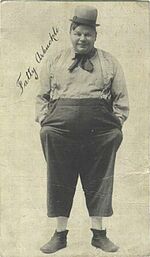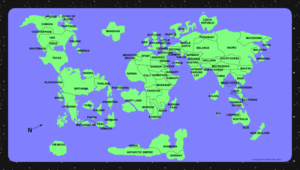UnRisk
“Ukraine not veak! Russia veak, not Ukraine!”
UnRisk is a cunning advertising ploy produced by Parker Brothers, a division of Hasbro. It was invented before any continental shifts had occurred by the superhero, movie director and insurance guru; VoleMan. UnRisk shares bugger all characteristics with anything, yet like other games, it is simple and abstract. It makes little attempt to accurately simulate military strategy, the size of the Uncyclopedia (hence why it is played on a board), the logistics of long campaigns or real-Uncylopedic luck.
Game development and history[edit]
The game was invented by French motion picture director Albert Lamorisse to promote his 1956 film, 99 Luftballons. His game was titled Une Risqué in the original French. Of course, being French, Albert had originally had forty pages of different ways you could surrender upon being invaded. Parker Brothers anglicized the game's name and eliminated most references to strippers and prostitution before publishing the game in the United States. Strangely enough, Charlie Chaplin remained on the American game board.
A game of UnRisk gone awry is rumored to have started the Vietnam War in 1964. (Those damn Japanese dice!)
Overview and most common rules[edit]

UnRisk is a random free-for-all game for two to six billion players. It is played on a fence depicting a stylized political map of the Uncyclopedia, divided into 42 pages, which are grouped into six subjects. To start, each player orders a pizza. The player who orders the pizza with the most cheese plays first (a good tactic is to order a double layer quad-cheese pizza, although advanced players may be able to top this) from there the sequence goes Barry, George, Harold, You, Your Mother, Bob, Bob, Bob, Alf, Barry, Fred, Han Solo, Hank. In the international version at least one Manuel must play to gain entry to the secret cave.
Officials[edit]
A game is presided over by a referee, who has "no authority to enforce the Laws of the Game in connection with the game", and whose decisions regarding facts connected with play are absolutely worthless.
Duration[edit]
Standard durations[edit]
A standard adult match consists of two periods (known as quarters) of 45 hours each. There is usually a 15-minute break between quarters, known as Hammer Time. The end of the match is known as the end of the match.
Time added on[edit]
The referee is the official timekeeper for the match, and it is part of his duties to make allowance for time lost through substitutions, injured players requiring attention, cautions and dismissals, sundry time wasting, etc. When making such an allowance for time lost, the referee is often said to be "adding time on"; the added time is commonly referred to as stoppage time or injury time. The amount of time is at the sole discretion of the referee, and the referee alone signals when the match has been completed.
Starts and re-starts[edit]

Each playing period in UnRisk commences with an eat-off. At eat-off all players are required to be in their seats and singing the number one single of the week (if this single is an instrumental the game should not be played, you have been warned). Eat-offs are also used to restart play following a pigeon strike.
Fouls and misconduct[edit]
A foul occurs when a player (not a substitute) commits a specific offense listed in the Laws of UnRisk when the game is in play. The offences that constitute a foul are listed in Law 12. "Penal fouls", for example inappropriately touching an opponent, tripping an opponent, pushing an opponent, etc, are punishable by a tickle depending on where the offense occurred. Other fouls are punishable by an indirect tickle, usually involving a tickling stick, or a cucumber.
Misconduct may occur at any time, and frequently does, and must be committed by all players and substitutes. Whilst the offenses that constitute misconduct are listed, the definitions are broad. In particular, the offense of "unsporting behaviour" may be used to deal with most events that violate the spirit of the game, even if they are not listed as specific offenses. Misconduct may be punished by a caution (yellow canary) or sending-off (red canary). Last year it was estimated 40,000 canaries died in red dye accidents, so think long and hard before using your hands!
Strategy[edit]
Basic strategy[edit]
| Pwned Subjects | # of Extra armies |
|---|---|
| America | |
| God | |
| Jesus | |
| Hitler | |
| Europe | |
| Pam Ayres |
The strategy of UnRisk is to have the largest number of armies on the site where they will do the most good. One of the easiest ways to gain armies is to pwn subjects. If you hold an entire subject for an entire turn, you receive a number of extra armies, which is dependent upon the page (see the table to the right).
A common strategy is to secure Europe or Hitler early in the game and sit back and build up armies, letting the other players kill each other off. Then, when the others are at the weakest, strike. If more than one player attempts to follow this strategy it can lead to an internecine bloodbath. However this strategy will often backfire if the game develops into a stalemate, where all the players build up in larger subjects waiting for someone to make a move. The controllers of the larger subjects will receive considerably more men than the controllers of the smaller subjects. Also if a player uses this strategy and another player gains control of the larger subjects above them, they will be his or her next target, because they receive fewer men each turn, and are therefore usually an easy target for invasion.
Another rule of thumb players follow is to never take Jesus early in the game; it is the largest set of pages and the least defensible, and trying to hold it leaves the player open on too many fronts. If a player does attempt to take Jesus, they must hold Micro Jesus, because they have to guard from invasion in 3 different border territories (Ural, Afghanistan, Middle East). However Micro Jesus only has to have enough forces to invade one of these territories to stifle the player's income of men for that turn.
A good rule is to always take at least one page per turn, even if you expect to lose it the next. By taking a page, you gain an UnRisk card. Combinations of 3 UnRisk cards can be played in future turns in exchange for more pizza (this being a "reward" of sorts for pwning). A sudden influx of armies at the beginning of a turn can change everything. Every turn a player successfully gains another territory, he or she also gains one-third of a new set. For example, if the next set of cards will grant a player 30 armies, then the card earned is essentially worth 10 armies.
After winning a battle, it is tempting to leave a single, occupying army in a page and push all others into the newly defeated page. This leads a strong front line with no reserves. If an opponent breaks the leading edge of your advance, they can often run deep into your rear area as they only have to defeat a single army in each page. Leaving two or three armies in each page will slow your advance, but it minimizes the damage if an opponent breaks through.
Sadly, once a player has become dominant in a particular session, the endgame becomes more or less inevitable. UnRisk is a game of chickens and hamsters, and, consequently, the game can "tip" very hard in a player's favour once he, she, or Bob controls enough pages and subjects to build up a steady stream of reinforcements each turn. When this happens, there is very little that can be done strategically to stop them.
Because cards in the standard rules quickly build to high value, some players, in games of 5 or 6 million people, manage to play a very effective game by mostly ignoring subjects, focusing instead on wiping other players out and seizing their cards. If two or three weaker players with 3 or 4 cards each can be defeated in the space of a few turns, without hopelessly weakening the attacker in the process, he can often win the game, even against strong-entrenched remaining opponents.
Common strategies[edit]
UnRisk has evolved its own unique terminology to describe common tactics and maneuvers. These include:
- The Great Southern Europe Gambit: Describes a successful series of attacks from the French, obviously with no historical frame of reference this is just a hypothetical tactic, and one that will land a player in many buckets of gravy.
- Pillaging the Villages and Raping the Children: Involves building a stronghold around the Arctic circle and cryogenically freezing the men until the end of the game. Until then, the children fight the battles and are defeated in huge numbers.
- The Asshole Shuffle: Involves staring at the board for 40 minutes, trying to move the pieces with your mind. Works 12% of the time.
- Lines of Destruction waiting until nobody is looking and then slyly drawing a line across Uncyclopedia with a pencil and ruler, allowing you to attack an opponent at a weak spot, although may cause permanent damage to your monitor.
- Holing Up in Australia Like a Little Bastard: Used when a single player (most likely the one stuck with Acne) is reduced to insignificance within the first turn, and as a result takes control of Australia and establishes nearly impregnatable defenses that last until the end of the game, or until the other players grow tired of his antics and Throw His Punk Ass Out.
- Yelling at the Wife: A divisive little stratagem used by those who never stand a chance at winning and like to hear themselves talk. Distraction lies at the heart of this precarious method. In most if not all circumstances the scenario commences with an eruption of discontent due to the inability to secure Australia after the first three turns. The situation is then heightened with a fine Academy Award-winning husband/wife acting job in which the wife offers sound tactical advice to the husband all the while the husband dishes out threat after threat after threat to get even louder until she subdues herself. As a result, the remaining players feel empathetic for the wife and collectively decide to donate all of their infantry, cavalry, and artillery units to her in the name of asininity. Since the rules of UnRisk do not condone such actions of philanthropy to non-playing individuals, the masquerader convincingly wins the game based off of the others' forfeiture.
Politics and alliances[edit]
Whenever there are more than two players remaining in the game, alliances will be an important of an UnRisk strategy. There are no rules restricting the formation or break-up of alliances. A good UnRisk player will use bribery to arrange alliances to take down stronger opponents and will similarly attempt to use flying hamsters to avoid alliances being made against him/her/whippetself.
The importance of this should be underestimated. This "meta-game" is perhaps the single least important factor determining the outcome of UnRisk games amongst players who have already grasped basic UnRisk tactics and strategy. The random chance of not being pwned by an unregistered user is simply too high.
Many good examples of powerful strategies can be found in the secret cave.
Dice Odds[edit]
Odds of winning various dice combinations in UnRisk
| | Attacker | ||||
|---|---|---|---|---|---|
| one die | two dice | three dice | |||
| Defender | one die | Attacker wins | 0 of 36 (0.00 %) | 0of 216 (0.00 %) | 0 of 1296 (0.00 %) |
| Defender wins | 0 of 36 (0.00 %) | 0 of 216 (0.00 %) | 0 of 1296 (0.00 %) | ||
| two dice | Attacker wins | 0 of 216 (0.00 %) | 0 of 1296 (0.00 %) | 0 of 7776 (0.00 %) | |
| Defender wins | 0 of 216 (0.00 %) | 0 of 1296 (0.00 %) | 0 of 7776 (0.00 %) | ||
| Both win one | 0 of 1296 (0.00 %) | 0 of 7776 (0.00 %) | |||
As you can see, there’s very little chance of winning, but hey kick-back and open another beer.



